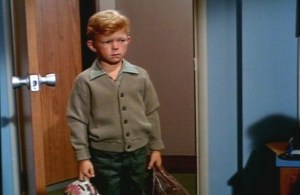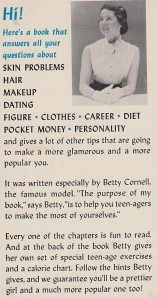
Welcome to the latest installment of my weekly Family Affair series!
Season 1, Episode 12, “Love Me, Love Me Not,” 12/5/1966
Written by: Peggy Chantler Dick. Directed by: William D. Russell.
Synopsis
In the opening scene, Jody accidentally breaks a vase with Uncle Bill’s golf club. Bill reacts with typical restraint, noting that accidents happen.
Later, Jody accompanies French to an Italian grocery and witnesses his friend Pepino being spanked for breaking a window.

Pepino gets tough love from his father, a character who apparently escaped from Life with Luigi
When Jody expresses his confusion, Papa Umberto explains that he punishes his son out of love.

Pepino himself seems less convinced about the spanking=love argument.
Suddenly, Uncle Bill’s patience begins to seem like indifference, and Jody tries to provoke a spanking.

First, Jody gives Scotty the doorman Uncle Bill’s favorite skiing sweater. This only earns Jody a commendation for generosity.
Jody’s second transgression is disturbing the chess game Mr. French is playing by mail. But what finally sets Uncle Bill off is his worry when Jody runs away at night (though Jody never actually leaves the building).

The little runaway.

The little runaway, discovered.
Uncle Bill delivers a stern–though not physical–punishment but promptly begins to doubt himself and relent. Finally, he realizes where Jody’s coming from and gives the boy a punishment and a gentle spank (“for thinking for one minute that I don’t love you”).

Preparing to lay the smack down.
Random Thoughts
This episode shows why Brian Keith’s Uncle Bill is such an ideal father figure–affectionate, playful, understanding. In these early episodes, Uncle Bill is warm and demonstrative with Jody in a way that seems unusual and refreshing for a 1960s TV father and son.

Aww…
Johnny Whitaker is also adorable in this episode, especially in the scene at the end when he’s waiting for his spanking with closed eyes and gritted teeth.

Is this cute or what?
Uncle Bill’s self-doubt with regard to parenting is realistic and continues the theme of adjustment which has been building all season.
Guest Cast
Pepino: Ricky Cordell. Umberto: Romo Vincent. Scotty: Karl Lukas.
Continuity Notes
The kids’ favorite TV show, Captain Hippopotamus, is mentioned twice. Uncle Bill’s partner, Ted Gaynor, is mentioned, though not seen.

Okay, this is a Jody episode, but how about a little random Buffy cuteness?
Notable Quotes
“I wish I could get Uncle Bill to love me enough to sock me.”–Jody
“When he socks me, half of it will be yours.”–Jody to Buffy
“An apology is the act of a real man when he knows he’s wrong.”–Uncle Bill

So manly and rugged and yet so gentle and loving with kids…sigh.
Today’s Bonus Feature
This might be a little hard to follow. TV Radio Mirror April 1969 featured two articles that both had a split focus on Brian Keith and Diahann Carroll. The “TV Kids” article is worth reading, especially for the description of interaction between Keith and Johnny Whitaker.
(The other headlines on this magazine cover are ridiculous, and why did they use a cover photo that showed Anissa Jones at such a disadvantage?)






 Starting today, I’ll be posting holiday old-time radio episodes every Tuesday and Thursday through Christmas day. I have about 600 to pick from, so let me know if you have any requests!
Starting today, I’ll be posting holiday old-time radio episodes every Tuesday and Thursday through Christmas day. I have about 600 to pick from, so let me know if you have any requests!
 About This Book and Its Author: Christian publishing house Zondervan published this book, the work of a former U.S. Navy chaplain named Alfred L. Murray. Though the book has a Christian viewpoint, it focuses on the way young people relate to each other, rather than their relationship with God. Murray is enthusiastic about the social benefits of dating, though of course he urges a conservative code of behavior.
About This Book and Its Author: Christian publishing house Zondervan published this book, the work of a former U.S. Navy chaplain named Alfred L. Murray. Though the book has a Christian viewpoint, it focuses on the way young people relate to each other, rather than their relationship with God. Murray is enthusiastic about the social benefits of dating, though of course he urges a conservative code of behavior.























